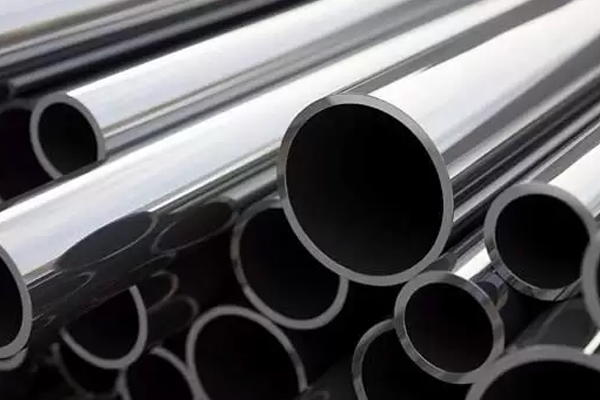Stainless Steel 304 pipes are among the most widely used stainless steel pipes in various industries due to their exceptional corrosion resistance, durability, and versatility. They are commonly used in applications ranging from food processing and chemical industries to construction and automotive sectors. This blog provides a detailed overview of Stainless Steel 304 pipes, including their specifications, properties, applications, and advantages.
What is Stainless Steel 304 Pipe?
Stainless Steel 304 is an austenitic stainless steel alloy containing 18% chromium and 8% nickel, offering excellent resistance to oxidation and corrosion. It is one of the most commonly used stainless steel grades due to its affordability, durability, and ease of fabrication.

Stainless Steel 304 Pipe Specifications
- Material: Austenitic Stainless Steel (304/UNS S30400)
- Manufacturing Process: Seamless, Welded, ERW (Electric Resistance Welded)
- Size Range: 1/8" to 36" (Nominal Pipe Size - NPS)
- Wall Thickness: Schedule 5 to Schedule 160, XXS
- Standards: ASTM A312, ASTM A213, ASTM A249, ASTM A269
- Surface Finish: Polished, Bright Annealed, Mill Finish
Chemical Composition
Stainless Steel 304 pipes have the following chemical composition:
- Chromium (Cr): 18.0 – 20.0%
- Nickel (Ni): 8.0 – 10.5%
- Carbon (C): 0.08% max
- Manganese (Mn): 2.0% max
- Silicon (Si): 1.0% max
- Phosphorus (P): 0.045% max
- Sulfur (S): 0.03% max
Mechanical Properties
- Tensile Strength: 515 MPa (75,000 psi) min
- Yield Strength (0.2% offset): 205 MPa (30,000 psi) min
- Elongation: 40% min
- Hardness: Rockwell B 92 max, Brinell 201 max
Key Features and Benefits of Stainless Steel 304 Pipes
- Excellent Corrosion Resistance – Resistant to oxidation and most acids, making it ideal for harsh environments.
- High Strength & Durability – Provides excellent mechanical properties and long service life.
- Hygienic & Non-Reactive – Ideal for food processing, pharmaceuticals, and medical applications.
- Versatile Applications – Used across multiple industries, including construction, automotive, and marine.
- Ease of Fabrication – Can be easily welded, machined, and formed.
- Heat & Temperature Resistance – Suitable for high-temperature applications.
- Low Maintenance – Does not require coatings or special treatments to prevent rusting.
Applications of Stainless Steel 304 Pipes
Stainless Steel 304 pipes are widely used in various industries, including:
- Food & Beverage Industry – Used in dairy, brewing, and food processing equipment.
- Chemical & Pharmaceutical Industry – Piping systems for transporting chemicals and pharmaceuticals.
- Oil & Gas Industry – Fluid transportation in refineries and offshore drilling.
- Construction & Architecture – Structural applications and handrails.
- Automotive Industry – Exhaust systems and fuel lines.
- Water Treatment Plants – Used for water purification and desalination systems.
- Marine & Shipbuilding Industry – Withstands harsh marine environments.
- HVAC & Refrigeration Systems – Used in heat exchangers and cooling systems.
Stainless Steel 304 vs. 316: Which One Should You Choose?
| Property | Stainless Steel 304 | Stainless Steel 316 |
| Chromium Content | 18-20% | 16-18% |
| Nickel Content | 8-10.5% | 10-14% |
| Molybdenum | None | 2-3% (Improved Corrosion Resistance) |
| Corrosion Resistance | Excellent | Superior (Better for Marine & Chemical Environments) |
| Cost | More Affordable | More Expensive |
| Applications | General Use | Harsh Chemical & Marine Environments |
How to Select the Right Stainless Steel 304 Pipe
When selecting Stainless Steel 304 pipes, consider the following factors:
- Application Requirements – Determine if seamless, welded, or ERW pipes are needed.
- Size & Thickness – Ensure compatibility with system requirements.
- Surface Finish – Choose based on aesthetic and functional needs.
- Testing & Certification – Verify ASTM standards compliance for quality assurance.
- Supplier Reputation – Purchase from reliable manufacturers for quality and durability.
Conclusion
Stainless Steel 304 pipes are an excellent choice for industries requiring high-quality, corrosion-resistant, and durable piping solutions. Their versatility, ease of fabrication, and cost-effectiveness make them a preferred option for many applications, from food processing to construction. Ensuring the right specifications and selecting a trusted supplier will help maximize the efficiency and longevity of these pipes in your projects.
Looking for High-Quality Stainless Steel 304 Pipes? Contact Us!
For premium Stainless Steel 304 pipes at competitive prices, get in touch with us today for expert guidance and bulk orders.